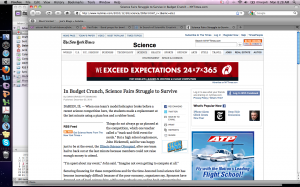January 3rd, 2011 by Frank LaBanca, Ed.D.
Note: This article is cross-posted in the CSSA Newsletter. Be a part of the discussion, join my personal learning network, and leave a comment on its contents here.
A recent New York Times article by Emma Graves Fitzimmons discussed the financial woes of many science fairs across the country. Sponsors have dropped out, financing has been cut and organizers are scrambling to find money. The sad reality is that some of these events are being canceled. These authentic experiences for students are often important career-leading catalysts for young, budding scientists and engineers. Although not mentioned in the article, of local concern has been the greater Danbury area Science Horizons Science Fair.

from: New York Times
Science Horizons recently announced that it would be unable to financially support its regional Fair this year, and unfortunately, this important threshold opportunity, which brings a diverse group of students together, will be lost. Science Horizons is optimistic that it can obtain funding to restore the Fair in 2012. Science Horizons is encouraging each member school to support a local fair and will provide support by sending local winners to the Connecticut (State) Science Fair, held at Quinnipiac University this March. They will also fund some awards at the State fair. The reality of the US economic downturn’s impact on meaningful, authentic educational experiences for students hits home with this announcement.
Science Horizons is a nonprofit organization that has served the greater Danbury area’s budding scientists and engineers since xxx by offering a venue for middle and high school students to present the results of their original, long term experimental research. Each year typically over 600 students present projects at their annual Fair. Science Horizons is staffed totally by volunteers and raises all its money privately.
In the spring of 1989, as a high school junior, I had the distinct pleasure of participating in Science Horizon’s Science Symposium. This experience for me was transformational. I can point to that experience as one that helped me recognize that science was both a logical/analytical a creative endeavor, that an extended project was a rigorous, meaningful way to learn, and that science was a process – so much more than a collection of facts in a textbook. I pursued a degree in Biology, worked in a Bacterial Genetics lab doing methods development for the Human Genome Project, became a high school science teacher, and have worked directly with over 200 students who have conducted and presented high quality research. Many of these students have also pursued careers in science, the health sciences, and engineering.
With Connecticut’s budding knowledge-based economy, a scientifically-literate and educated workforce is critical. Opportunities like the Science Horizons Fair must be viewed as a necessity.